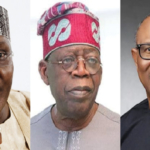
Force Public Relations Officer, Olumuyiwa Adejobi, tells ABIODUN SANUSI about the preparedness of the Nigeria Police Force to ensure a violent-free general election which begins today, among other related issues
Considering the prevalence of crime in some regions, how ready are the police for the elections?
The message is clear that we’re ready on our side. The Independent National Electoral Commission has said it on several occasions that it is ready, and since INEC is ready, we’re ready too. There was a recent meeting with at the Defence Headquarters at the instance of the Chief of Defence Staff, General Lucky Irabor, where it was finally agreed once more that we’re good to go. The CDS on Tuesday (last week) said the military was prepared, the IG also said it that the police are ready, and all of us are on the same page and we are good to go and ready to have the election. The police have done what the police should do; we’re partnering all agencies particularly the military. They’re helping us and many other security agencies are also on board. We’re doing our deployment on the ground just as we’re doing on paper, and we’re everywhere in and out, each and every polling unit will be protected.
How adequate is the deployment of operatives and equipment?
Every area will be protected; states, senatorial districts, local government areas will be adequately protected, even interstate borders. Also, the military and other intelligence agencies are helping to protect external borders. Again, the deployment of weapons and operatives has been made to every area, and there is no cause for alarm. If it is time for us to actually do heavy deployment and enforcement of law on any miscreant, we will do so. We have deployed new equipment, and we have all it takes to ensure that the elections are successful.
The IG said there are indications that some Yoruba Nation agitators have plans to disrupt the elections in the South-West. What are the police doing to ensure that this plan doesn’t come to fruition?
The IG didn’t just talk; the IG based his submission on the threat analysis that we’ve done. The police didn’t do it alone; we did threat analysis with all other security agencies and the intelligence community in Nigeria. We came together to have analysis on states and local government areas. So, the IG’s submission is based on a particular empirical information, empirical fact, and if that is the case, the police and the intelligence community are out there to do the needful.
If somebody is inciting the public and he can cause serious problem, that person will be picked up. If anybody is threatening the state, and threatening the security of Nigeria, that person can be picked up for profiling if the need arises or when necessary. The person can even be prosecuted depending on the magnitude of his offence or what he has actually done to nail him for prosecution.
Although we’ve not actually identified a particular issue as threat in the South-West region or Yoruba land, with the recent development of issues from Yoruba Nation agitators, especially considering what recently happened in Lagos, where vehicles were set ablaze, we started beaming our searchlight towards the South-West to know the gravity of what is happening beyond the surface, even beyond the election period.
But if we’re having a group that is coming up and behaving like terrorists; whether they’re agitating for something or not, and they’re not doing it in a civilized manner, the Federal Government can decide to declare them a terrorist group and may treat them as terrorists.
Which regions have peculiar insecurity issues?
For now, it is only the South-East and the North-West, and the insurgents are being decimated. In the South-East, we know we have the issue of the Indigenous People of Biafra and the Eastern Security Network. In the North-West, it is banditry and the likes which also spread to the North-Central.
In the North-East, it used to be Boko Haram terrorists, but that one has gone down drastically. The South-South and the South-West are almost sharing the same thing. IPOB activities didn’t spread to the South-South, but there are kidnappings, pipeline vandalisation and the likes. Also, cultism is rampant in the South-South and parts of South-West.
These are the things we are looking into, and some of these groups are armed, and once you’re armed and you continue to cause chaos, the Federal Government will look at it, and may declare the group as a terrorist group just as it did with the bandits. We know Boko Haram members as confirmed terrorists, later bandits were declared terrorists, also IPOB and ESN has been declared terrorists.
But Simon Ekpa declared that there will be no election in the South-East. Will you arrest him?
Who is he to declare that there will be no election in the South-East? Nobody has the power over a region, state or even local government to declare to the public that there will be no elections there. It is quite unfortunate that people dogmatically follow some of these people with strange and unpalatable ideologies.
Meanwhile, concerning his arrest, I’m sure the international community, NIA and Interpol will be working on that. I’m sure they’re working underground to neutralise all the threats that are coming from individuals or a group of people to jeopardise Nigeria and to truncate our effort to ensure we have a peaceful 2023 general election. Anytime we see a threat like such, even if it is coming from abroad, international level, we don’t keep quiet; we do all we need to do. It is not all the time we come and make things public. No one has the power to tackle the sovereignty of a nation; no one has the power to declare a curfew or a state of emergency or sit-at-home. All these are things that are not normal; they’re strange to our system and that is why we are taking them with all seriousness they deserve.
Residents in that region know these people, but the residents should not forget that a criminal is always a criminal, no matter how close you are to a criminal. It is an ideology, it’s a perception. When they want to strike, they won’t care about you. These people causing problems in the South-East are killing their kinsmen and their relatives. It is a deliberate act to ruin the economy, politics, status, and social lives of the people in that particular region. Who are those that are responsible for this? They’re also from the region?
So, elders and kings in the region should be able to talk to their people. They need to talk to these people who have been armed by certain individuals to cause problem in the land. South-East is part of Nigeria and that’s where we are deploying our resources to subdue the activities of IPOB and ESN. If not for the intervention of security operatives, perhaps we won’t be talking about the South-East today. We don’t want to lose any local government to terrorism; we don’t want to lose any geopolitical zone to terrorists. We will stand firm, and the Nigerian flag will continue to be hoisted in every area of this country. Even in the North-East where Boko Haram members were hoisting their flag before. We’ve subdued them.
How about the issue of deployment of security operatives to regions battling insurgency?
Although we can’t mention the total number of equipment and troops deployed to the regions as that is a security issue, but we made deployments based on threat analysis. We have made adequate deployment to the South-East and the North-West. Immediately the President unveiled the anti-riot equipment last week, they were deployed, and that was about the third deployment of equipment nationwide. Now IPOB and ESN activities are becoming prevalent in Anambra, with incidents happening frequently these days. But the CP has consulted the IG, and we’re hopeful that things will improve there.
Also, the Imo State governor recently bought some APCs and other weapons, and that’s why you can see that the activities of IPOB in the state have gone down. In fact, their activities had gone down in most of the cities in Imo State because the governor was proactive by getting the equipment after he consulted the IG. So, we urge the governors of other states in the South-East too to meet with the IG. They can do it per state or per the entire region, and the IG will advise them on how to go about solving similar problems in their states.
The problem in the North-West is banditry, and we’re decimating those ones too. The military and the police have deployments in the North-West and the South-East, and we’re carrying out those operations to decimate the activities of insurgents in both regions. In the North-West, banditry has reduced drastically, although not totally eradicated, it has reduced and we’re still working. The military and the police have major operations that are ongoing in the North-West and we’re sustaining the operation so that we will be able to decimate their activities.
We’re not recording high cases of attacks like we used to record which means that our efforts have paid off to an extent, but we’re going to still do more. We’re going to do more because we always have support from the Federal Government and also get funds to do certain things as these operations are expensive. They’re very expensive but we thank the President for coming to the aide of the security agencies. We are carrying out special operations in the South-East and North-West regions of the country to decimate the activities of insurgents such as the Indigenous People of Biafra, Eastern Security Network and bandits.
Concerning the North-East, there is no big deal in the North-East sincerely. The activities of terrorists in the North-East have been decimated; we now have a rebuilding process ongoing in the North-East. After peacemaking, we had peace keeping, and now we have peace rebuilding. It is now in a stage of rebuilding. We’re on the reconstruction of damaged areas. Normal activities have returned to some of these places. I’ve travelled with the IG to most of these places. Go to Borno State, you won’t think they’ve experience terrorism before. Go to Yobe, Adamawa states, go to some of these states, you will see that things have changed for the better.
Concerning deployment of arms and ammunition, can you give an approximate or total number of deployment and distribution?
We can’t give the total number of arms and ammunition that had been deployed nationwide. However, several deployments have been made. Don’t forget that the last time the President came to unveil arms and ammunition was the third time. We have procured and also distributed thousands of equipment to our commands and formations nationwide.
Also, some governors, although not all of them, have come to the aide of the police by providing patrol vehicles. In fact, some have gone as far as providing fuel and maintenance for these vehicles, and we appreciate those ones. Others can still do better and can still come up to assist the police and other security agencies in their various areas. So, we hope that with the support and intervention of our governors, our commands and formations will do better.
What are the police doing concerning vote-buying and selling?
With the incorporation of the Economic and Financial Crimes Commission, the Independent Corrupt Practices and Other Related Offences Commission and other anti-graft agencies to monitor the elections physically, the anti-graft agencies will be helping in the areas of tackling vote-buying and selling. We don’t want to be distracted; while our men are ensuring security, the anti-graft agencies will tackle vote-buying and selling, and our officers can always assist.
In fact, the EFCC have been doing that, the ICPC also have been supporting in that area. Our Force Intelligence Bureau men too are out there. In fact, we’ve done deployment specifically for that too.
How do the police intend to handle cases of ballot snatching in today’s election and the one that will come up later?
They’re just wasting their time. Ballot papers are being colour-coded; it is per local government; it is per polling unit. If you take one from a polling unit now, you can’t go to another polling unit to use it. It is a waste of time and energy. However, for the deviant ones, they shouldn’t come because we have implemented restriction of movements. It is vital and we’re going to enforce it. Also, for the little movement on election days, we’ll not allow people move in large numbers or move in group(s). So, just one person can’t come to a polling unit where there are about 50 persons to say he wants to overpower the people; it’s not possible. When they’re not allowed to move in groups, they will not have the power to come and disrupt the election.
Some said they will bring dogs to polling units to deter thugs. Is that right?
It is not allowed, except for people that are fond of moving around with their pets; nothing wrong about that. However, if anyone wants to go out with his dog, he must ensure that the dog is registered. Every dog they are rearing must have a number and they must have an identification card and must have been tested rabies-free. Nobody will stop people from bringing pets, but they must ensure to follow the conditions outlined. Each of the dogs must be licensed; the ID card must be hanged on its neck before it is taken to any polling unit.
What’s the duration for the restriction of movement?
The Inspector-General of Police, Usman Baba, has ordered a restriction of all forms of vehicular movement on roads, waterways, and other forms of transportation, from 12 am to 6 pm on election day. However, this is with the exception of those on essential services such as officials of the Independent National Electoral Commission, election observers, ambulances responding to medical emergencies, and fire-fighters among others.
This is part of measures emplaced to ensure a safe, secure, and environment conducive for the conduct of elections, and to ensure public order management, safety of the electorate, as well as assisting security agencies in effective policing, thereby preventing hoodlums and criminally-minded elements from disrupting the electoral process.
Similarly, the IG sternly warned all security aides and escorts to desist from accompanying their principals and politicians to polling booths and collation centres during the election as anyone found flouting this directive will be severely sanctioned. Also, only security personnel specifically assigned to election duties are to be seen within and around the designated election booths and centres.













